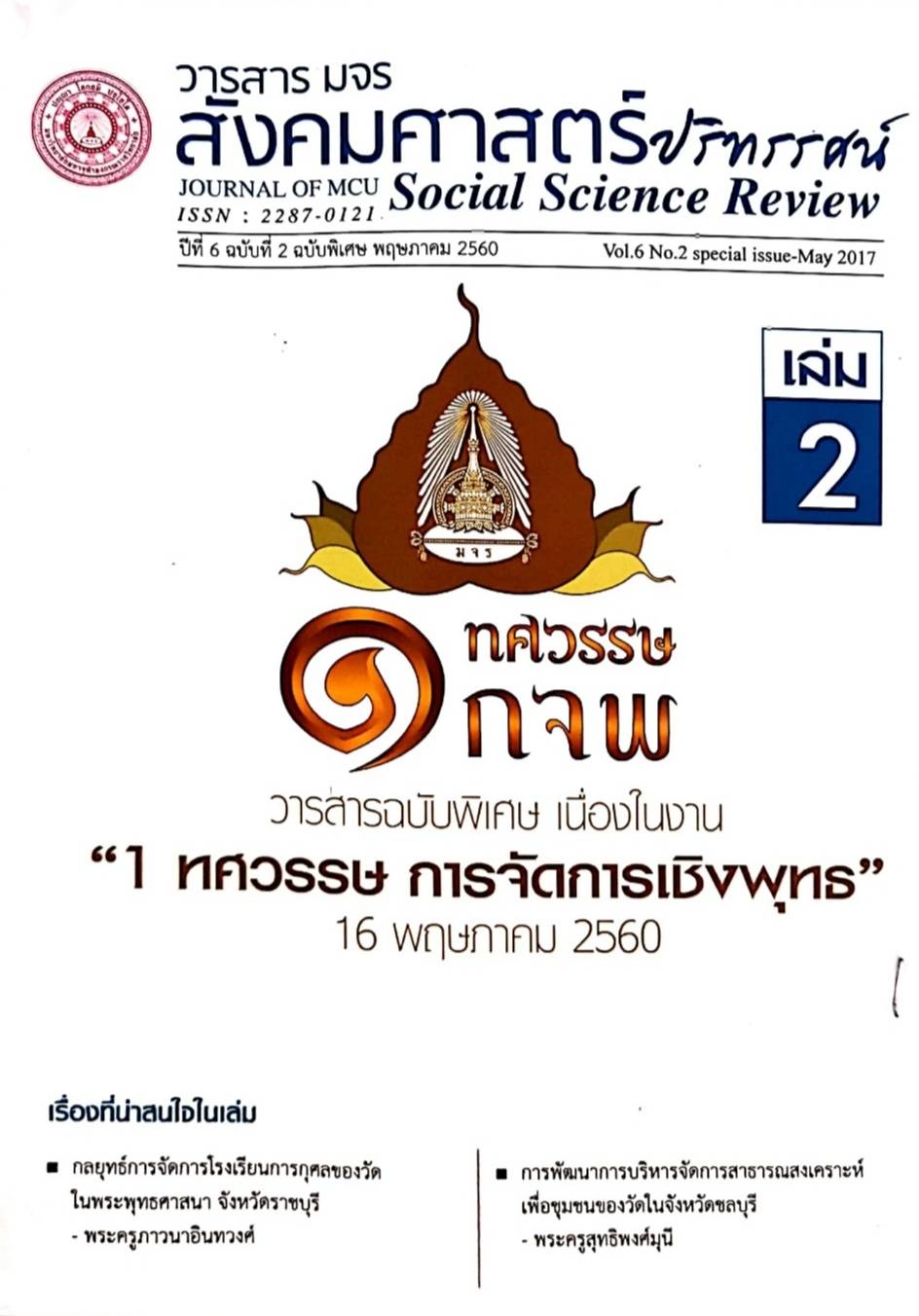การพัฒนาการสร้างเครือข่ายการจัดการศึกษาของสำนักปฏิบัติธรรมเพื่อเพิ่มพูน คุณธรรม จริยธรรมของชุมชนในภาคอีสาน
คำสำคัญ:
พระพุทธศาสนา การจัดการศึกษา คุณธรรม จริยธรรม เครือข่าย ภาคอีสานบทคัดย่อ
การสร้างเครือข่ายไม่ได้จากัดอยู่เพียงสำนักปฏิบัติตัวเอง แต่หมายถึงการสร้างเครือข่ายต่อสำนักปฏิบัติธรรมอื่น ทั้งที่เป็นสาขา ตลอดจนเชื่อมโยงไปยังผู้ปฏิบัติที่เป็นข้าราชการ พ่อค้าประชาชน นักเรียน นักศึกษา พระภิกษุ สามเณร ร่วมกันทั้งภาคปริยัติและภาคปฏิบัติเพื่อให้เกิดความเข้าใจ หลักศีล สมาธิ ปัญญา อันส่งผลต่อการเพิ่มพูนคุณธรรม จริยธรรมของชุมชน การวิจัยนี้เป็นการวิจัยเชิงคุณภาพ มีความมุ่งหมายเพื่อ (1) เพื่อศึกษาความเป็นมาของการจัดการศึกษาของสำนักปฏิบัติธรรมในภาคอีสาน (2) เพื่อศึกษาวิเคราะห์ระบบเครือข่ายการจัดการศึกษาของสำนักปฏิบัติธรรมในภาคอีสาน (3) เพื่อศึกษาการพัฒนาการสร้างเครือข่ายการจัดการศึกษาของสำนักปฏิบัติธรรมเพื่อเพิ่มพูนคุณธรรม จริยธรรมของชุมชนในภาคอีสาน เครื่องมือที่ใช้ในการวิจัยได้แก่แบบสัมภาษณ์ แบบสังเกต แบบสนทนากลุ่ม ทาการเก็บข้อมูลเอกสารและข้อมูลภาคสนาม ข้อมูลภาคสนามได้จากการสัมภาษณ์ การสังเกต การสนทนากลุ่ม และจาก ผู้รู้ 9 รูป/คน ผู้ปฏิบัติ 66 รูป/คน และให้ข้อมูลทั่วไป 12 รูป/คน ในเขตจังหวัดนครราชสีมา บุรีรัมย์ และจังหวัดสุรินทร์ นำข้อมูลมาตรวจสอบข้อมูลด้วยวิธีการแบบสามเส้า วิเคราะห์ข้อมูลตามความมุ่งหมายที่ตั้งไว้ และนำเสนอผลการวิจัยโดยวิธีพรรณนาวิเคราะห์ ผลการวิเคราะห์ ตอนที่ 1 ความเป็นมาของการจัดการศึกษาของสำนักปฏิบัติธรรมในภาคอีสาน ผู้วิจัยได้ดาเนินการรวบรวมข้อมูลในพื้นที่วิจัยใน 6 สำนักฯ ของภาคอีสานตอนล่าง ประกอบด้วย สำนักปฏิบัติธรรมวัดศิริบ้านไร่, สำนักปฏิบัติธรรม คลองตาลอง, สำนักปฏิบัติธรรม โพธิ์ย้อย, สำนักปฏิบัติธรรมวัดวนานุรักษาราม สำนักปฏิบัติธรรม วัดป่าโยธาประสิทธิ์ สานักปฏิบัติธรรมวัดโสรประชาสรรค์ ซึ่งมีที่ตั้งอยู่ใน 3 จังหวัด คือ จังหวัด นครราชสีมา จังหวัดบุรีรัมย์และจังหวัดสุรินทร์ มีองค์ประกอบ 9 ด้าน ได้แก่ 1.ด้านหลักสูตร 2.ด้านวิทยากร 3. ด้านบุคลากร 4. ด้านงบประมาณ 5. ด้านอาคาร สถานที่ 6. ด้านวัสดุ อุปกรณ์ ด้านวิชาการ 8. ด้านธุรการ 9. ด้านการบริหารจัดการ ซึ่งบางสำนักก็มีการดาเนินงานไม่ครบทุกด้าน ส่วนใหญ่มีการบริหารครบแทบทุกด้าน แต่กระบวนการขององค์ประกอบบางอย่างไม่สามารถดูแล หรือที่จะสืบทอดต่อไปได้ วิเคราะห์เครือข่ายการจัดการศึกษาของสานักปฏิบัติธรรมในภาคอีสาน ทั้ง 6 สานัก มีจุดอ่อนและจุดแข็งแตกต่างกันไป โดยสภาพพื้นที่ไม่มีความแตกต่างกันมากนัก เพราะสำนักฯ ล้วนใช้หลักสูตรการอบรมเดียวกัน ระยะเวลาต่างกัน และวิทยากรที่มาอบรมเป็นพระสงฆ์ในวัด งบประมาณได้รับจากการบริจาคและสมทบทุนจากหน่วยงานภาครัฐ การสร้างอาคารต่างๆ ก็มีลักษณะคล้ายกัน วัสดุ อุปกรณ์ก็จะมีการจัดเตรียมอย่างเพียงพอ มีการบริหารจัดการทั้งฝ่ายธุรการ และเจ้าสำนักฯ ทั้ง 6 แห่งจะเข้ามากำกับดูแลด้วยตนเอง การพัฒนาการสร้างเครือข่ายการจัดการศึกษาของสำนักปฏิบัติธรรมเพื่อเพิ่มพูนคุณธรรม จริยธรรมของชุมชนในภาคอีสาน แนวปฏิบัติที่ดีของการพัฒนาเครือข่ายการจัดการศึกษาที่ส่งเสริมสำนักปฏิบัติธรรมประกอบไปด้วย 3 ส่วน คือ 1) แนวทางในการพัฒนาเครือข่าย 2) กระบวนการในการพัฒนาเครือข่าย 3)เงื่อนไขความสำเร็จในการพัฒนาเครือข่าย ภายใต้องค์ประกอบของสานักปฏิบัติธรรม 9 ด้าน ได้แก่ด้านหลักสูตร, ด้านวิทยากร, ด้านบุคลากร, ด้านงบประมาณ, ด้านอาคาร สถานที่, ด้านวัสดุอุปกรณ์, ด้านวิชาการ,ด้านธุรการ,ด้านการบริหารจัดการ นอกจากนี้จะต้องมีการเชื่อมโยงเครือข่ายไปยังสำนักปฏิบัติอื่นๆ ด้วยจึงจะเป็นการพัฒนาสานักปฏิบัติธรรมอย่างรวดเร็ว มีประสิทธิภาพและยั่งยืน
เอกสารอ้างอิง
Chanhouse, B. (2001). Administrative behaviour of abbots that impacts upon temple events under the jurisdiction of the clergy in Bangkok. PhD thesis, Silpakorn University, Bangkok.
Chidkoksoong, Phramaha S. (2009). Development of a model for meditation in temples for preserving peace in the communities of Nakhon Ratchasima Province. PhD Thesis, Mahasarakham University, Thailand.
Foongwannaluk, A. (1995). Buddhism assemble members' media exposure, expectation and gratification from Buddhism talk shows on television. Bangkok: Chulalongkorn University Press.
Kanaboot, Phra S. (2004). The management of Buddhist schools: General education plan in Bangkok. Bangkok: Dhurakij Pundit University.
Kruawong, Phra W. (2008). Guidelines for increasing visitor satisfaction at Wat Ton Son Meditation Office, Angthong Province. Ayutthaya: Phra Nakhon Sri Ayutthaya Rajabhat University.
Phuthong-Ngeun, N. (2012). Personnel administration of schools administrators according to the four sublime state of mind principles in the educational development center area 1-4 under the office of Khon Kaen Primary Educational Service Area 1. PhD Thesis, Mahachulalongkornrajavidyalaya University, Bangkok.
Reukrai, D. (1984). Concepts of satisfaction with basic living needs. Bangkok: Office of Policy and Planning.
Sansakorn, Phra P. (2006). The role of monks in the distribution of Buddhism for social development: A case study of Sahuskhun District, Kalasin Province.Graduate Studies Journal, Sakhon Nakorn University, 3(12): pp.119-127.
ดาวน์โหลด
เผยแพร่แล้ว
รูปแบบการอ้างอิง
ฉบับ
ประเภทบทความ
สัญญาอนุญาต
ลิขสิทธิ์ (c) 2020 วารสาร มจร สังคมศาสตร์ปริทรรศน์

อนุญาตภายใต้เงื่อนไข Creative Commons Attribution-NonCommercial-NoDerivatives 4.0 International License.
เพื่อให้เป็นไปตามกฎหมายลิขสิทธิ์ ผู้นิพนธ์ทุกท่านต้องลงลายมือชื่อในแบบฟอร์มใบมอบลิขสิทธิ์บทความให้แก่วารสารฯ พร้อมกับบทความต้นฉบับที่ได้แก้ไขครั้งสุดท้าย นอกจากนี้ ผู้นิพนธ์ทุกท่านต้องยืนยันว่าบทความต้นฉบับที่ส่งมาตีพิมพ์นั้น ได้ส่งมาตีพิมพ์เฉพาะในวารสาร มจร สังคมศาสตร์ปริทรรศน์ เพียงแห่งเดียวเท่านั้น หากมีการใช้ภาพหรือตารางหรือเนื้อหาอื่นๆ ของผู้นิพนธ์อื่นที่ปรากฏในสิ่งตีพิมพ์อื่นมาแล้ว ผู้นิพนธ์ต้องขออนุญาตเจ้าของลิขสิทธิ์ก่อน พร้อมทั้งแสดงหนังสือที่ได้รับการยินยอมต่อบรรณาธิการ ก่อนที่บทความจะได้รับการตีพิมพ์ หากไม่เป็นไปตามข้อกำหนดเบื้องต้น ทางวารสารจะถอดบทความของท่านออกโดยไม่มีข้อยกเว้นใดๆ ทั้งสิ้น





